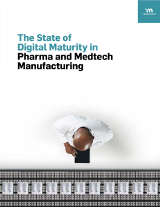
GxP Lifeline
Unlocking Data With Digital Manufacturing Solutions in the Medtech Industry

Data is a central part of digital transformation in manufacturing for medical device and diagnostics companies. Yet as manufacturers wrangle already-vast, fast-growing amounts of data being generated in production and other areas, teams often turn to spreadsheets or standalone systems because they don’t have readily available and centralized data.
According to one recent study, 62% of manufacturing executives surveyed said their organization uses pen and paper to track vital manufacturing steps, while 50% reported using spreadsheets or a computer on wheels.1 In another, 83% of frontline manufacturing workers in the U.S. reported still using paper to follow work instructions or track their work.2
This means important data remains siloed due to digital gaps between paper or disconnected systems. Spreadsheets, scanned documents, and standalone systems may have served manufacturers adequately in the past, but they are no longer sufficient, stifling access to and analysis of the data and the intelligence that medtech data analytics could provide.
Manufacturers are now taking steps to create digital connections between different data sources to close these offline data gaps and leverage better medtech data analytics. In a 2022 survey of medtech and other life sciences manufacturing executives from MasterControl, executives and managers cited improving data visibility to drive decision-making and gaining real-time data tracking as key reasons to digitize their manufacturing environments, respectively.3
3 Ways to Improve Data Management with Manufacturing Execution Software
In a new brief exploring medical device industry trends, MasterControl highlights three steps that medtech manufacturers can take to reshape their operations and achieve manufacturing excellence using manufacturing execution software.
#1: Error-Proof Data Entry
Digital manufacturing solutions should eliminate data-entry errors by making it impossible to make them in the first place. Modern manufacturing execution software like MasterControl’s can enable right-first-time (RFT) production every time. With MasterControl Manufacturing Excellence, automated data integrity checks and error-proofing features that reduce mismarked, illegible, or missing information on digitally integrated electronic device history records (eDHRs) ensure data is entered completely and correctly. Manufacturing execution software enforces out-of-specification and nonconformance limits, controls, and thresholds with integrated, data-driven prompts and notifies operators of all open deviations and corrective actions/preventive actions (CAPAs).
#2: Embrace a Manufacturing Execution Platform Approach
Integrated, cloud-based platforms have become the most reliable means of breaking down information silos and providing visibility and access to important metrics. Manufacturing execution softwarelike Manufacturing Excellence enables broad integrations with core information applications in the manufacturing IT ecosystem – such as enterprise resource planning (ERP) and material requirements planning (MRP) – for a more complete view of the data within the business. By integrating the disparate enterprise applications with a fully digital manufacturing solution with eDHR, and capitalizing on platform dynamics, medtech manufacturers can capture and share real-time production data across systems and departments seamlessly enabling accurate medtech data analytics.
#3: Simplify Medtech Data Analytics and Reporting
Fully connected and intelligent manufacturing execution software like MasterControl’s provides real-time data access and analytics tools needed to contextualize data, make informed decisions, and deliver significant quality and productivity improvements. Manufacturing Excellence includes cross-platform data insights, a prebuilt interactive dashboard library, user-friendly data exploration and visualization, and robust data sharing and scheduled reporting. With improved access to shop floor data that is fully digitized, medtech manufacturers can glean real-time insights, better understand how their shop floor is working, identify bottlenecks, and make actionable, data-driven product- and process-related decisions.
References:
- "2018 Manufacturing Vision Study… The Road Ahead,” CSSI Technologies, April 2018.
- "The State of the Connected Frontline Manufacturing Worker, 2021,” Parsable, October 2021.
- "2022 Digital Manufacturing Maturity Study,” MasterControl, 2022.
Free Resource

Enjoying this blog? Learn More.
The State of Digital Maturity in Pharma and Medtech Manufacturing
Download Now